Sustainability
Sustainability Governance
Sustainability Governance
At Tokuyama, we strive to enhance our corporate value to remain a company that society needs, and take proactive actions toward realizing a sustainable society, guided by our Mission —"to create a bright future in harmony with the environment, in collaboration with our customers, based on chemistry"—.
To further promote sustainability management and ensure effective and efficient internal control, Tokuyama reorganized its sustainability promotion framework in April 2025. We established the Sustainability Executive Committee, chaired by the President and Executive Officer, with all Executive Officers as members, and with Audit and Supervisory Committee members, including Outside Directors, eligible to attend. The Committee deliberates and resolves on company-wide sustainability issues, formulates and monitors plans, and addresses important matters related to internal control.
Under the Sustainability Executive Committee, expert committees have been established for fields that are highly specialized and critical from the perspectives of sustainability and internal control, including compliance, financial reporting, fair trade and competition law compliance, security trade control, cyber and information security, safety and environmental measures, and product safety and quality assurance. Each expert committee is chaired by the director responsible for its respective area.
The deliberations of the Sustainability Executive Committee are reported to the Board of Directors for oversight. Matters stipulated in the approval rules are subject to resolutions by the Board of Directors. In addition, the Auditing Department conducts regular audits of sustainability-related management systems, and the results are reported to the President and the Board of Directors.
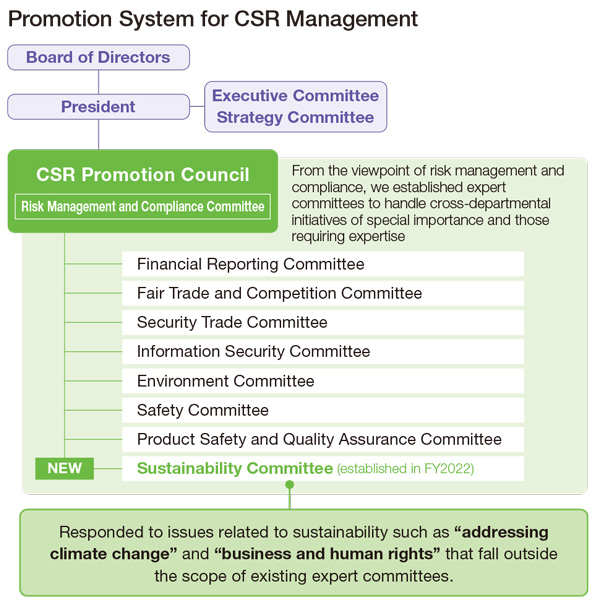
Risk Management system
Tokuyama deliberates on sustainability-related risks and opportunities, including the significant risks listed below, at the Sustainability Executive Committee established in April 2025, and instructs or delegates actions to business divisions and/or subsidiary expert committees.
Each expert committee, chaired by the director responsible for its area, examines and determines mitigation policies for the significant risks under its jurisdiction (including risk reduction, avoidance, transfer, and retention), and proposes and implements measures to address risks. These committees then conduct regular reviews of the results of any implemented actions, and manage execution in accordance with the management system.
Beginning in FY2025, the scope of the significant risks has been partially revised. With respect to "information security risks," we added risks associated with DX and IT implementation, which are essential to structural reform, and revised this term to be "information security and IT risks." Additionally, in light of recent growing tensions around cybersecurity and the widespread use of IT in business operations, we have increased the scale of potential damage and impact by one level. Management will reaffirm the importance of information security and IT risks, and demonstrate its commitment to taking all possible measures to address them.
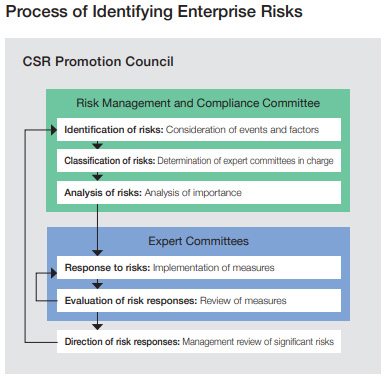
The table below can be scrolled horizontally
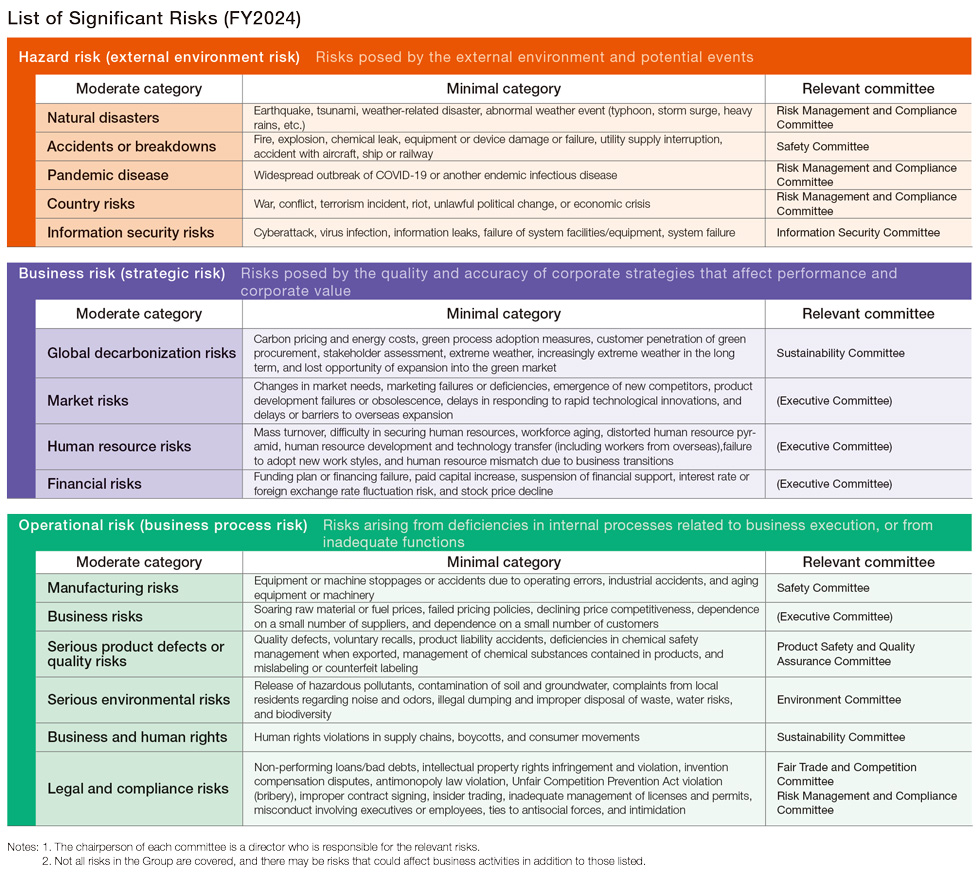
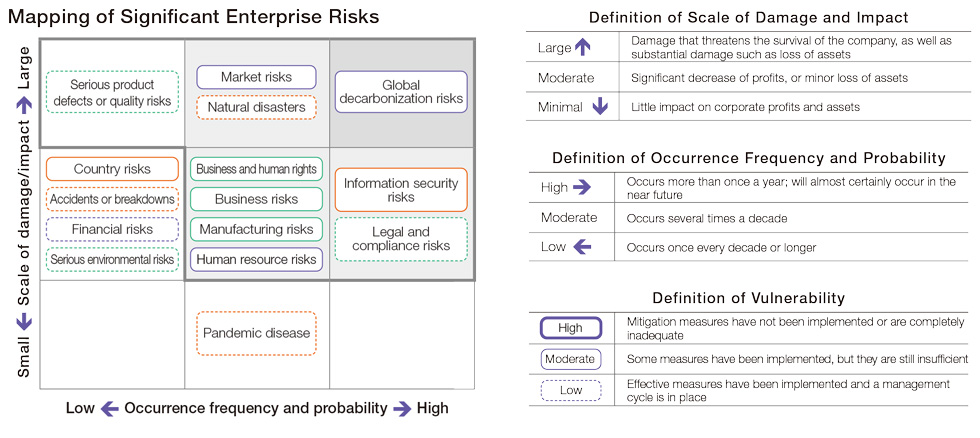
Business Continuity Management (BCM)
Tokuyama has formulated, and continues to update, a BCP (business continuity plan) to ensure that circumstances do not prevent important operations from continuing. We also secure funding and resources to make certain that business keeps going, as we engage in business continuity management in normal times, including taking preventive measures, while we strengthen our ability to continue business operations.
Compliance
Tokuyama understands "compliance" to have a broad meaning, including not only compliance with laws and internal rules but also behaving sensibly in a manner that conforms with corporate ethics and meets social expectations. To communicate and spread awareness of compliance throughout the Group, the Company has put together a handbook presenting the Tokuyama Group Code of Conduct, the Tokuyama Group's Five Conscience Clauses, etc., It is distributed to all Group employees.
Compliance Education & Training
To communicate and spread awareness of compliance throughout the Group, Tokuyama provides training on legal obligations for new directors and auditors of Group companies and a variety of compliance training programs for employees. In 2023, these training programs were held on 60 occasions. The Company also implemented a variety of e-learning programs focused on 5 occasions in total Mental Health Management and human rights etc.
The table below can be scrolled horizontally
| FY2020 | FY2021 | FY2022 | FY2023 | FY2024 | |
|---|---|---|---|---|---|
| Compliance training results | 45 | 60 | 48 | 60 | 58 |
| Implementation of e-learning programs | 5 | 3 | 5 | 5 | 8 |
Whistle-Blowing System
An internal helpline has been established to enable safe, anonymous reporting and consultation regarding compliance violations involving the Tokuyama Group (including potential violations) without fear of unfavorable treatment. Reporting and consultation can be carried out by post, email, or phone.
The helpline is operated with due consideration for the protection of whistleblowers. Employees can use the helpline without disclosing their name or department to the Company, and a female attorney is also available for consultation. In April 2024, we established a "Global Helpline" to enable local employees of overseas Group companies to report and consult in their native language. As a result, the coverage rate of the reporting contact point for consolidated companies has reached 100%. In fiscal 2024, we will strive to raise awareness and educate employees to promote the use of the helpline.
The table below can be scrolled horizontally
| FY2020 | FY2021 | FY2022 | FY2023 | FY2024 | |
|---|---|---|---|---|---|
| Number of reports* | 24 | 34 | 29 | 44 | 44 |
| * Includes reports on workplace harassment and reports from Group companies in Japan. | |||||
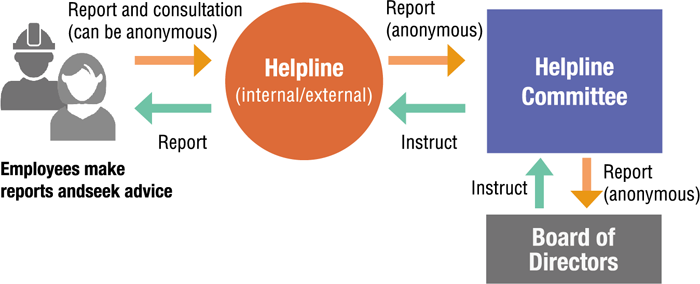
Program to Prevent Harassment
Harassment itself is a compliance violation, and there are also cases in which major problems are behind harassment, such as inappropriate operations. Given this, the Tokuyama Group started a Harassment Prevention Program to wipe out harassment from the Group. As one of these efforts, we have designated December as Harassment Prevention Enhancement Month and are conducting educational activities.
Information security policy
Revised April 1, 2021
Security incidents, such as cyber-attacks and unauthorized access, present serious risks to internal control system and have the real potential to compromise business continuity and adversely impact society's trust in a company. The Tokuyama Group therefore considers responses to information security risks and cyber security risks (hereinafter referred to as "security risks") as important management issues common to the entire Group and makes concerted efforts to reduce these security risks.
-
Development of a security risk management structure
Tokuyama shall establish an organizational structure and internal rules for security risk management capable of handling normal operations and emergencies, in order to address any security incidents that could potentially arise at the company, Group companies, or in the supply chain, as and when they occur. In addition, management shall ensure the effectiveness of the security risk management system by gaining a full understanding of security risks before they occur and appropriately allocating management resources, such as securing and training personnel with appropriate skills, and allocating the necessary budget. -
Implementation of security risk management
Recognizing that changes in the business environment and the adoption of new technologies give rise to new security risks, Tokuyama regularly assesses the security risk management status of all Group companies and comprehensively implements security risk countermeasures as and when appropriate, and ensures the effectiveness of such countermeasures. -
Compliance with laws, ordinances and regulations
Tokuyama complies with security risk-related laws, ordinances and guidelines, and ensures the effectiveness of security risk management. -
Education and training
Tokuyama provides the necessary education and training to enable Group employees (including, where necessary, those involved in the supply chain) to recognize the importance of security risk management, and to engage in appropriate use and management of the internet, cloud services, and information devices, etc. -
Detection and response to security incidents
In order to minimize the damage caused by a security incident, Tokuyama makes efforts to detect security incidents and signs of security incidents at an early stage, and in the event that a security incident is detected or identified, appropriate response measures are taken immediately, and appropriate measures to prevent reoccurrence are taken after the incident is resolved.
Tokuyama Group Artificial Intelligence Policy
Effective November 1, 2025
The Tokuyama Group recognizes that properly utilizing artificial intelligence to advance sustainable growth and medium- to long-term value creation is an important corporate social responsibility. The Group has established this Artificial Intelligence Policy under the Tokuyama Group Code of Conduct, with which all employees shall comply.
-
Basic Approach to Artificial Intelligence
The Tokuyama Group will actively utilize artificial intelligence (AI) technology to contribute to the sustainable development of the chemical industry and help create solutions to societal issues. In developing, providing, using, and otherwise deploying AI, we will comply with international norms, relevant laws and regulations, OECD AI Principles, and other guidelines. -
Scope of Coverage
This policy applies to all officers and employees of the Tokuyama Group, as well as all AI-related operations (development, provision, use, etc.) in which the Tokuyama Group is involved. -
AI Governance Framework
The Tokuyama Group will establish and enforce strict standards and rules for developing, providing, using, and otherwise deploying AI. In addition, a dedicated committee will regularly monitor the status of AI operations and identify, assess, and manage the risks and opportunities associated with the utilization of AI. -
Commitments in AI Utilization
In developing, providing, using, and otherwise deploying AI, the Tokuyama Group will uphold the following principles.
1) People-centric perspective and respect for human rights
The Group will take a people-centric approach, recognizing that AI is intended to complement human capabilities and that the final decision-making is carried out by humans. The Group will ensure that the use of AI does not adversely impact our diverse stakeholders' human rights.2) Ensuring safety and fairness
In utilizing AI, the Group will implement sufficient safety measures to ensure that no harm is done to stakeholder lives, bodies, property, or mental well-being or to the environment. The Group will also work to eliminate any bias or unfair treatment based on gender, age, nationality, political beliefs, religion, or other factor.3) Privacy protection and information security
The Group will strictly comply with such laws and regulations as Japan's Act on the Protection of Personal Information and ensure that personal information is properly managed. In addition, the Group will implement technical and organizational security measures to maintain the confidentiality, integrity, and availability of its AI systems.4) Protecting intellectual property
The Group will respect intellectual property rights such as copyrights and avoid infringing on the rights of third parties.5) Transparency and accountability
The Group will ensure transparency regarding the purpose, mechanisms, and limitations of AI usage, maintain accountability to stakeholders, and promptly disclose information as necessary.6) AI literacy education
The Group will provide ongoing education and human resource development to enhance AI literacy — namely, the knowledge, skills, and ethical awareness required to ensure that AI is used appropriately.7) Continuous improvement
As AI technology evolves rapidly, the Group will periodically review this policy, taking into account trends in technology and societal demands. In addition, the Group will also place importance on dialoguing with stakeholders and strive to improve its AI utilization initiatives as needed.

